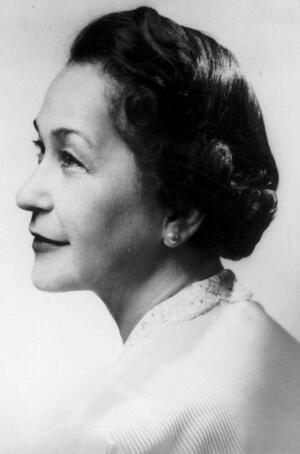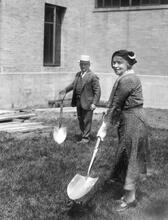Miriam Freund-Rosenthal
Miriam Freund-Rosenthal brought her passion for art and history to her leadership of Hadassah. She became involved in Zionism at an early age, thanks to her mother, a Zionist and friend of Henrietta Szold. She earned her doctorate in history from New York University in 1935 and made her first trip to Palestine that year. After her return, she spoke to Hadassah groups about her experiences, and in 1940 she was asked to join its national board. In 1943 she chaired the American Zionist Youth Commission before becoming national president from 1956 to 1960. She served as chair of their education, Zionist affairs, and youth survey committees as well as representing Hadassah at the United Nations. She and her husband, Harry Rosenthal, created an educational endowment fund for Hadassah.
Article
Miriam Freund-Rosenthal combined a career in Hadassah leadership with an avid interest in Judaic scholarship, specializing in American Jewish history. Which was the “career” and which the “avocation” is difficult to say, since she found many avenues for intertwining her dual loves of Zion and of Jewish learning.
Born in New York City on January 1, 1906, to Harry and Rebecca Kottler, Miriam came to her Zionism at her mother’s knee. Her mother had belonged to the first Zionist women’s group on New York’s East Side, the Daughters of Zion. Because of her mother’s activism, Henrietta Szold visited the Kottler home in Perth Amboy, New Jersey, and as a child Miriam learned about Youth Lit. "ascent." A "calling up" to the Torah during its reading in the synagogue.Aliyah and the nascent medical system of the Jewish community in Palestine prior to the establishment of the State of Israel. "Old Yishuv" refers to the Jewish community prior to 1882; "New Yishuv" to that following 1882.yishuv [Jewish settlement in Palestine]. In her autobiography In My Lifetime (1989), Freund-Rosenthal stated, “My life was shaped and illuminated by three unusual women. … Rebecca Kottler, my mother, my friend, my colleague; Henrietta Szold, teacher, scholar, trailblazer, and founder of Hadassah; Eleanor Roosevelt, wife of the thirty-second President of the United Sates and world patron of Youth Aliyah.”
She married Milton Freund in 1927, having postponed the wedding until she had earned her master’s degree from New York University. Two sons were born to them, Matthew and Harry. By 1935, she had earned her doctorate in American history from New York University. Her doctoral thesis was published under the title Jewish Merchants in Colonial America. In 1935, too, she made her first trip to Israel, where she encountered Henrietta Szold and Rose Halprin.
On her return home, Freund-Rosenthal was asked to speak to Hadassah groups about her visit, and in 1940, she was asked to join the national board of Hadassah. The pressures of motherhood plus a public school teaching position caused her to resign in 1942, but she was lured back in 1943, after leaving her teaching job, to chair the American Zionist Youth Commission. She held many Hadassah National Board portfolios including National Vocational Education chair, National Youth Aliyah chair, and vice president.
In 1956, Freund-Rosenthal was elected national president of Hadassah. During her four-year tenure, Hadassah built and dedicated its new medical center at Ein Kerem, in Jerusalem, Israel. Freund-Rosenthal was instrumental in persuading Marc Chagall to design and execute the twelve stained-glass windows symbolizing the twelve tribes of Israel for the hospital synagogue, which have come to be known as the “Chagall Windows”; she described these events in her monograph Jewels for A Crown: The Story of the Chagall Windows. After leaving the presidency, she held other board posts, including the chair of Education, Zionist Affairs, Hadassah Magazine, two Youth Survey committees, and nongovernmental representative to the United Nations.
She continued her scholarly pursuits as well, becoming a founding member of the World Bible Society and delivering a paper, “Medicine and the Hebraic Tradition,” at the twenty-fifth International Orientalist Congress in Moscow in 1960.
In 1968, her husband, Milton Freund, died of a heart attack. In 1974, she married Harry Rosenthal and moved to his home in St. Paul, Minnesota. Together they created an educational endowment fund for National Hadassah, which has sponsored educational seminars. Even in her late eighties, she spearheaded the compilation and editing of A Tapestry of Hadassah Memories, a collection of interviews and memoirs of Hadassah leaders. Miriam Freund-Rosenthal died on January 18, 1999, just after her ninety-third birthday.
Selected Works by Miriam Freund- Rosenthal
In My Lifetime: Family, Community, Zion (1989).
Jewish Merchants of Colonial New York (1939).
A Tapestry of Hadassah Memories, editor with Lonye Rasch (1989).
EJ.
“Personal Information for Miriam Freund Rosenthal.” Jewish Women’s Archives website, 2003.
“Hadassah leader, responsible for Chagall windows, dies.” J, The Jewish news weekly of Northern California, January 22, 1999.




